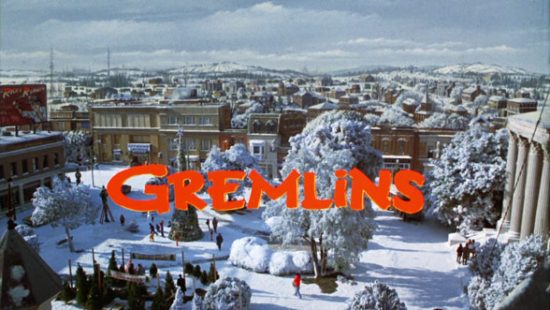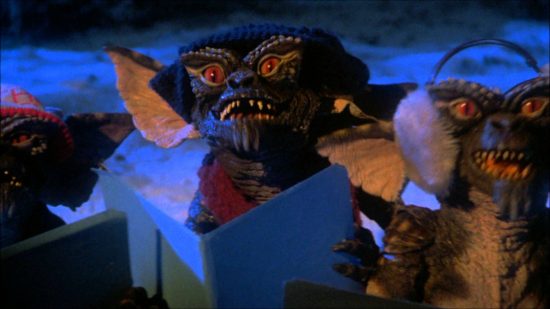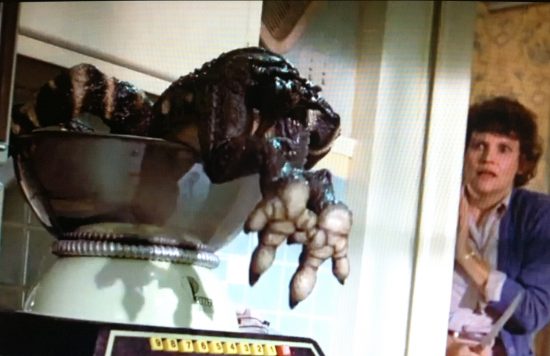Why Gremlins is the best Christmas film
I don’t like mince pies. There. I said it. But it feels like it should be said standing up, in a circle of similarly afflicted people who all nod and know the feeling. It’s a revelation that often brings tutting, shaking heads and questions, as though disliking a spicy preserve in pastry is an affront to Christmas itself. You might ask what this has to do with Joe Dante’s 1984 film, Gremlins. Well lately, that same reaction that can also be encountered when I tell people Gremlins is my favourite Christmas film.
I love Christmas. Watch Muppet Christmas Carol with warm mulled wine, be my guest. There are plenty of reasons to enjoy these ‘most loved’ classics. Yet, there is comfortable predictability in tradition, like already knowing what a wrapped present is by only the slightest of shakes. Gremlins however is a gift that keeps you guessing, all the familiar Christmas ingredients are in the mix but unlike its conventional peers, the result is uniquely different.
‘What about Die Hard?’ I hear you cry. Well, it’s obviously a great film and another notable outlier, but for me it doesn’t embrace festive motifs quite in the same way. Gremlins is a film that subverts the clichés, self reverentially poking fun at the cheerful expectations. It’s dark and chaotic but still manages to be hilarious festive fun.
For those who question Gremlins inclusion as a Christmas film, unwrap the plot and you will find a yuletide gift at its centre, a ‘cute’ Mogwi called Gizmo who, it turns out comes with a few rules. Keep him away from bright lights, never get him wet and certainly don’t feed him after midnight. When Billy (Zach Galligan) accidentally spills water on Gizmo he strangely multiplies but these new Mogwi are different, more mischievous. Later, as they trick Billy into being fed after midnight their transformation into reptilian like Gremlins is complete.
The location (Kingston Falls) where all this takes place couldn’t be more festive. A small town enveloped in Christmas, a picture postcard vision of the season. Blanketed in snow there are trees for sale while the soundtrack blasts out “Christmas (Baby Please Come Home)”. It creates a timeless feel and this idealised view evokes It’s a Wonderful Life. The similarities are pretty clear and intentional (if it looks familiar in another way it was shot on the same backlot as Back To The Future) Essentially the films beginning is pretty much what you expect from a film produced by Steven Spielberg and written by Christopher Columbus.
Some of the characters are clear archetypes. Mrs Deagle (Polly Holliday) especially, is a villain straight out of a Charles Dickens book, a landlord who is mean spirited at the holidays, sound familiar? As the plot unfolds and the chaos ensues it becomes clear that Gremlins is anything but conventional. Like Dickens, does Mrs Deagle find redemption through invoking the past and changing her ways? Nope she meets her demise on end of a sped up stair lift. It’s this sort of unpredictable surprise that makes the film.
Like the Gremlins themselves the film Metamorphoses, from cheesy holiday cheer to horror film. This is where Dante really gets to impress his style into the piece, channelling 50s B-movie horror into some fantastic moments, (my particular favourite being a kitchen scene where some Gremlins meet their end). But Gremlins can’t really be pigeon holed into one category; it’s a constant mashing of genres and homages, it switches from Cartoon comedy to Christmas caper via horror. Similar to his other work Dante never fails to embrace the more ridiculous elements to comedic effect. One minute the gremlins are a knife wielding terror, the next they are found carol singing.
This is the films strength and delivers some of its best moments, for example the bar scene which sees so many comedy moments all thrown into one segment but it’s actually all terrorisation. There is however, one scene in particular scene which is a good gauge of how much you will enjoy this film. It’s a bit of a Marmite moment and Dante himself feels it “encapsulates the entire tone of the movie”. Kate (Phoebe Cates) who accompanies Billy in attempting to destroy the creatures explains the reason why she hates Christmas.
It’s a scene that can divide an audience, but it’s effective as a serious moment that turns into dark humour. It’s a good reflection of how to tone is changeable in the film but also the how unrealistic the whole thing is (don’t get started on minute details such as time zones or how Gremlins can be in snow and not multiply), inevitably this approach brings comedy. Dante had to fight to keep the scene in the final cut but as he describes “It’s funny to us in the way that it’s funny if you see someone fall on a banana peel it looks funny, but if it happened to be you who just broke your back, it’s not funny”.
This pattern is not just limited to Kate. Murray Futterman (Dick Miller) is a man who repeatedly complains about how foreign cars never work (they put Gremlins in them), trusting American engineering instead, only to be injured with his own Kentucky Harvester.
So why is Gremlins so relevant then? Well frankly it’s unlikely it would be made again today and it seems one of a kind. It’s inconceivable in 2016 that a major studio would create a new film with a cute character (that appeals the children) in the same film as dialogue such as “While most people are opening their presents, some are opening their wrists”, but the approach works so well that you don’t know whether to laugh or not at times. Director Joe Dante daringly mixes styles, changes perceptions and keeps surprising along the way. It is this heart of Gremlins that makes it works so well. It still stands the test of time today especially regarding it’s with its creature and special effects.
You could interpret that it’s a story about responsibilities and how not following the rules creates chaos but to some extent it’s also a representation of how Christmas isn’t always perfect. After all, Gremlins show the literal destruction of the type of idyllic Christmas town we see in it’s a Wonderful Life.
So this Christmas maybe take a break from the saccharine, commercialised vision of Christmas wonder, come over to the dark side and revel in the comedy and chaos of Gremlins.













